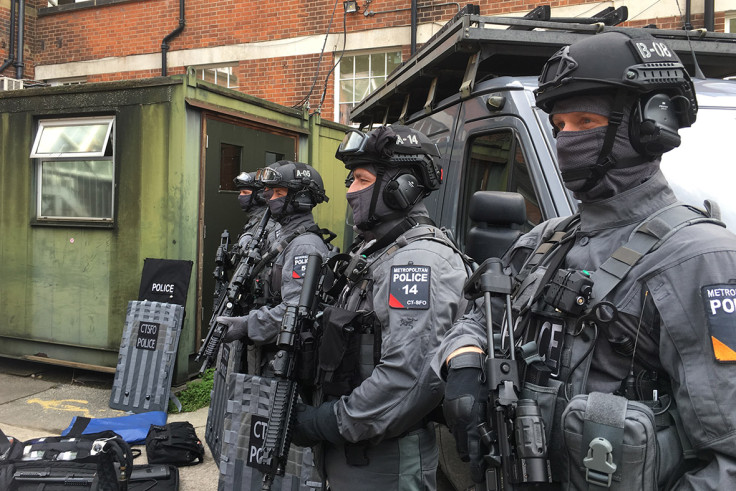We should beware of British bobbies 'tooling up' to take on terrorists
Jean Charles De Menezes proved that military-style training for police officers can lead to mistakes.

Masked and clad in grey coveralls and body armour, the new face of police counter-terror looked more like Blackwater mercenaries than cops at their unveiling this week. With their arsenal of vehicles, boats, bikes, shotguns, 'flash-bang' grenades and the gleaming assault rifles the officers cradled, the concentrated violent force at their disposal would put some military units to shame.
The main justification used for the existence of Britain's newest firearms officers is the threat of terror attacks. They, like the terrorists they have been formed to stop, are a clear product of the War on Terror: a militarised solution to a criminal issue.
Met Police Commissioner Bernard Hogan-Howe told the cameras that they would send a dual message: reassurance to the public and a warning to the "bad guys" that there were good officers willing to pick up a gun and take them on.
It is plausible that force – even lethal force – could be required to deal with a violent event. But language and tone of the unveiling was of war not law enforcement.
To understand this we might need to get past the spectacle of all the shiny new kit and start asking if the killing culture of the military can possibly dovetail with the idea of policing in the UK.
Policing by consent?
One of the varied motivations behind the foundation of a professional British police force was precisely to take the task of law enforcement out of the hands of soldiers.
Sir Robert Peel claimed that he founded a professional police force in part to liberate the British people from the maligned red-coated soldier or provincial militiamen who, until Peel's 1829 reforms, enforced the law, protected property and held the population in check.
He also lent his name to the force he created, members of which became known as Peelers or Bobbies.
It would be charitable to take Peel's word for his righteous motivations – he belonged to a set of authoritarian Tories after all – but from those ideas emerged a set of so-called 'Peelian values' which are unique to British policing. These include at their core the idea of policing by consent.
We ought to think hard about the history of how far we are willing to drift towards a militarised solution.
Consensual policing is a rightly contested concept. Clearly the UK population have little say in institutionalised racism or police spying, but taken at face value it is clearly a position that risks being undermined when you reinject it with martial values.
British armed police have often been trained by the UK military. It was reported as recently as January 2016 that this was still happening. In that case in the form of SAS soldier passing on deadly military skills.
To paraphrase General Sir Rupert Smith, whose book The Utility of Force on the proper use of military violence is considered seminal by many, force has two effects: it kills things and destroys stuff.
What Smith does not talk about is the culture which accompanies military-flavoured units. That is best explained by Ben Griffin – a former SAS soldier. His full lecture is titled The Making of a Modern British Soldier, and is probably the most compelling breakdown of the process of teaching and learning to engage in deadly violence available today.
That process, Griffin argues, had three main constituent parts and we must question vigorously whether these have any place in how Britain is policed.

Firstly, military-style training is meant to, and does, remove the barrier to kill. One example of how this is achieved is through language: on a firing range trainees are told to aim at the 'centre of mass' not the chest.
They are told targets – people – will 'fall when hit' not that bodies will drop when shot and so on.
Secondly, there is the instilling of a gang mentality. Not something unusual in the police though it would more normally be referred to more palatably as a tight-knit team ethic. This culture is brought about by arduous training. It is closed to outsiders, requires loyalty at any cost and to hell with everything else.
In fraught situations, or in tense times, such as in the aftermath of terror attacks, mistakes can be deadly.
In some ways this is admirable, but it also defies accountability and promotes a dislike of whoever is not in the gang. Soldiers, I can attest, hate nothing more than civilians. They also hate soldiers from different units.
Thirdly, military-style training teaches the subject to obey orders without question. Training for violent confrontation requires learning to react without pause.
This leads to mistakes and miscalculations at the best of times. In fraught situations, or in tense times, such as in the aftermath of terror attacks, it can be deadly.
One example of this is the killing, weeks after the 7/7 bombings, of Brazilian Jean Charles De Menezes who was chased down, pinned into a Tube seat, and shot to death by armed police.
When we consider how to police our country, in this time of very real threats, we ought to think hard about the history of how far we are willing to drift towards a militarised solution.
Joe Glenton is a journalist, an Afghan war veteran and author of Soldier Box, published by Verso Books.
© Copyright IBTimes 2025. All rights reserved.






















